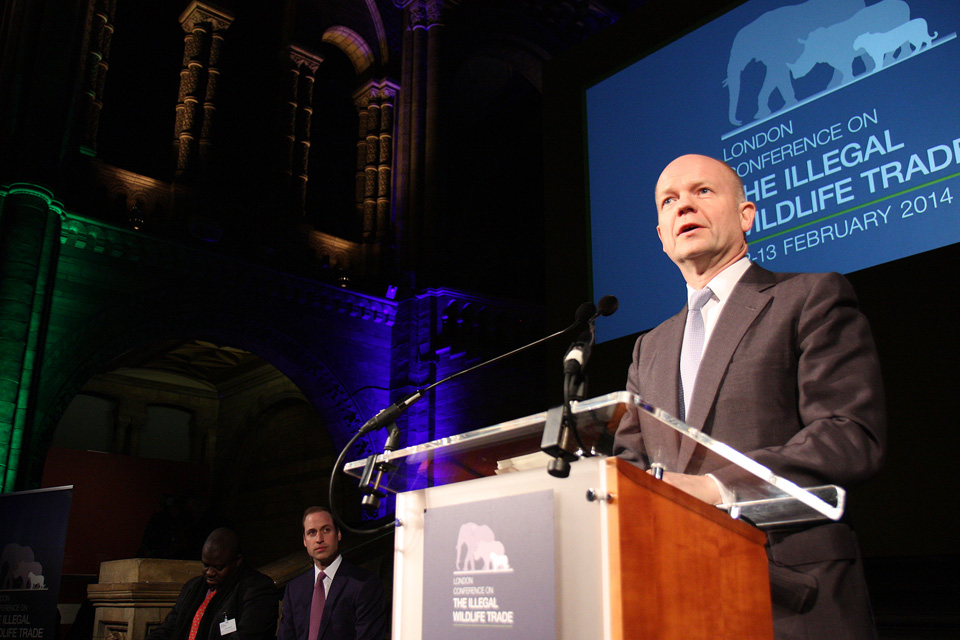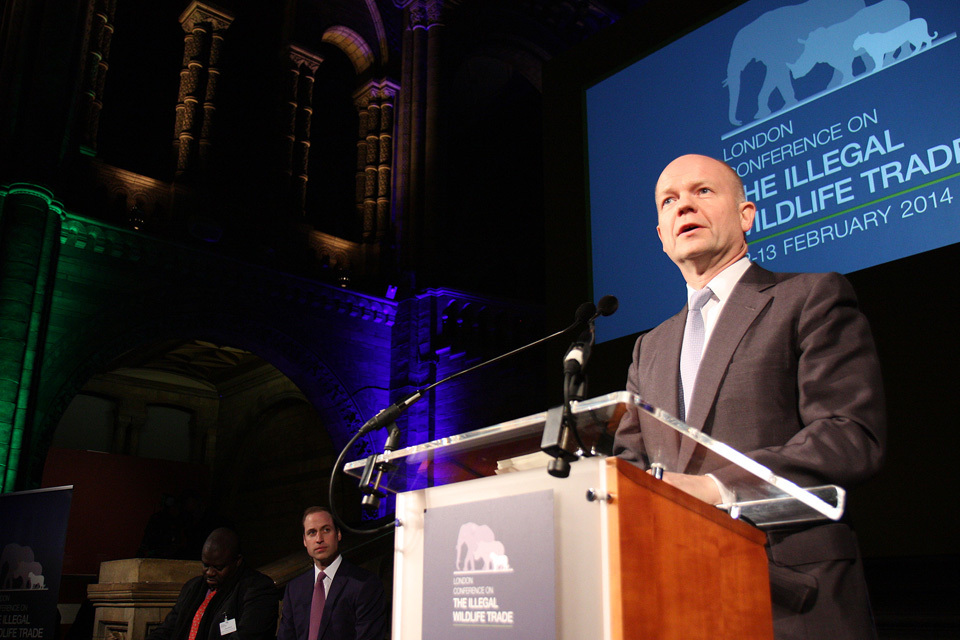Foreign Secretary's remarks at Illegal Wildlife Trade reception
In a speech at the London Conference on the Illegal Wildlife Trade the Foreign Secretary called for action to save some of the world's most remarkable species.

Your Royal Highness, My Lords, Ladies and Gentlemen, welcome to the National History Museum for the launch of the London Conference on the Illegal Wildlife Trade.
I am sure I speak for all of us in thanking His Royal Highness the Duke of Cambridge not only for being with us, but also for his efforts over many years as one of the leading champions of wildlife conservation.
This is a cause that the Royal Family has supported over several generations. There is no stronger signal of the importance the people of the United Kingdom as a whole attach to protecting Wildlife, your Royal Highness, than your participation in our conference, and I thank you for it.

The Foreign Secretary speaking at a reception on the eve of the London Conference on the Illegal Wildlife Trade.
I also pay tribute to United Wildlife and to the many other civil society organisations represented here tonight - for their indispensable work around the world, and for the advice and support they have given us in preparing for this important moment.
I believe that tonight we are on the brink of a crucial global turning point in the struggle against wildlife trafficking.
We all know that we are at the eleventh hour, perhaps even at a quarter to midnight, in the race to prevent the illegal wildlife trade from obliterating some of the most remarkable species in the world; including tigers, elephants, rhinos and orang-utans.
Many of us feel passionately strongly about this. It would be an utter tragedy if in our lifetimes these species were lost altogether because of human ignorance and greed.
With our power as human beings comes the responsibility to respect other life and to conserve our environment.
We can all imagine how history would judge us, and what future generations would say or feel about us, if we did not act now to protect some of the greatest creatures that share the planet with us.
Because this is an entirely man-made problem, we have it in our power to find the solutions.
We already have the knowledge, the resources, and the expertise we need to confront and overcome the illegal wildlife trade. And we are now adding to these foundations the crucial missing ingredient of political will:
In the last six months alone, China has crushed nearly 7 tons of ivory and smugglers’ cargo has been seized in Uganda and Togo.
The United States has put up a $1 million reward to bring down a major trafficking network.
Kenya has toughened penalties for poachers.
Botswana has held a pioneering Elephant Summit.
Germany and Gabon brought many of the world’s nations together at the United Nations General Assembly this year to call for new action.
And the Security Council itself has started to crack down on the illegal wildlife trade’s criminal bosses.
Nowhere is that leadership more strongly felt and needed than in Africa.
I am delighted that the Presidents of Botswana, Chad, Gabon and Tanzania are here, and congratulate them on their inspiring personal commitment to this cause.
With all this in place, our conference tomorrow must be ambitious.
We have brought together 41 countries, and 11 international organisations.
We must agree new steps to clamp down on illegal wildlife trafficking, to bring perpetrators to justice, to reduce the demand for endangered species that fuels death and destruction, and to invest in sustainable alternatives to poaching.
On the table are proposals for more audits of seized stockpiles and more illegal ivory destructions, so that criminals learn that illegal products will never turn a profit for them, no matter how long they wait.
I hope we will all sign up to concerted action to strengthen law enforcement and the capacity of criminal justice systems; including stronger border controls and much more cooperation so that we clamp down on trafficking.
We need to show a zero tolerance approach to corruption, and a pledge for all governments to have no commercial links whatsoever to endangered species products; and I hope we will signal new support to develop sustainable livelihoods and help to fund the crucial African Elephant Action Plan.
If we do all these things, and we are as I speak on the edge of some very important agreements, then I believe we can and will create the turning point that I spoke of earlier.
So this Conference is not the end of our work, it is a very important beginning of turning the tide.
If we all commit ourselves to this task, we will be able to look back years from now and know that when these animals were on the path to extinction, we intervened decisively to save them, for the benefit of our own and future generations.
I intend to support that effort for the long term, and thank you all for coming tonight and for the part that I know that you will play in saving the world’s most iconic animals, for their future and for the future of all humanity.